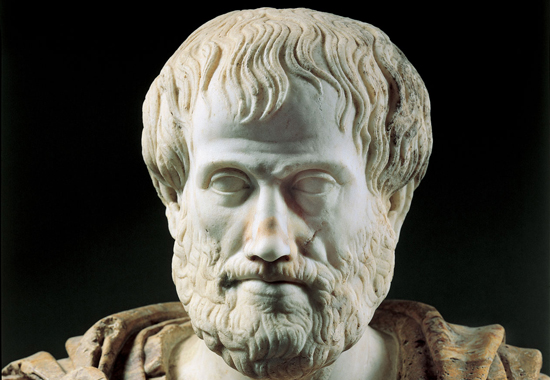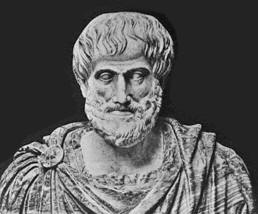|

Aristotle 384-322 BC
|
|
Image Above
Aristotle
DeA Picture
Library |
Aristotle was an ancient Greece philosopher. Among many other
things, he was also a scientist
and an expert on rhetoric.
He received a first class education by his
teacher
 Plato.
Plato.
Aristotle studied at Plato's Academy from approximately 367 BCE (at age 17) until Plato's death in 347 BCE. However, Aristotle's
empirical approach to knowledge and emphasis on observation diverged from Plato's focus on abstract forms.
He believed in finding truth through systematic study of the natural world, establishing foundations for scientific method.
Around the year 343 Aristotle went to
Pella where he started at his new job as private tutor to a 13-year-old boy
named Alexander, later
 Alexander the Great.
Alexander the Great.
Aristotle tutored Alexander from approximately 343-340 BCE, for about 3 years.
Later, Aristotle founded his own school, the Lyceum in 335 BCE in Athens.
The Lyceum was a school-research center where he taught while walking (leading to his students being called Peripatetics,
meaning "people who walk about").
The school combined formal lectures with collaborative research in multiple fields - from biology to metaphysics.
Students and teachers collected specimens, conducted observations, and built a library.
Morning sessions focused on advanced philosophical topics, while afternoon sessions were open to the public and
covered more general subjects.
ARISTOTLE'S LEGACY
Aristotle's most influential legacy is his systematic approach to knowledge and logic, which shaped Western thought for over 2000 years.
His most famous work is likely "Nicomachean Ethics," which established virtue ethics and continues to influence modern moral philosophy.
In science, his biological classifications and empirical methods were groundbreaking, though his physics theories (like the four elements)
were eventually disproven.
"Rhetoric" is Aristotle's comprehensive analysis of persuasion in public speaking. He defines three modes of persuasion: ethos (credibility),
pathos (emotional appeal), and logos (logical reasoning). The work also covers speech structure, style, and delivery techniques.
It remains influential in modern communication theory, political discourse, and public speaking.
And here is
 Aristotle's Rhetoric provided by the Stanford Encyclopaedia of Philosophy.
Aristotle's Rhetoric provided by the Stanford Encyclopaedia of Philosophy.

ARISTOTLE
And maybe, see
also
 Human Rights
Human Rights
More History
|